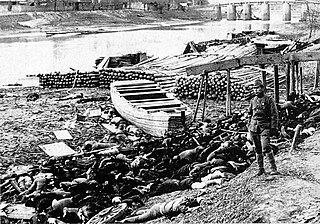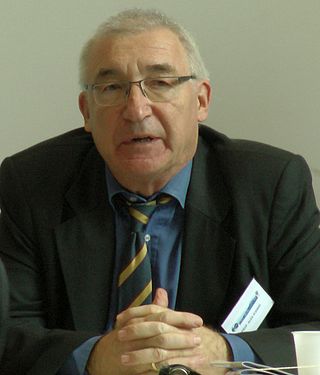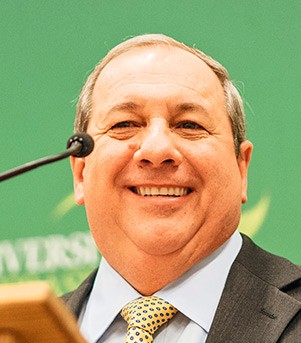Related Research Articles

State terrorism refers to acts of terrorism which a state conducts against another state or against its own citizens.

Terrorism, in its broadest sense, is the use of intentional violence and fear to achieve political or ideological aims. The term is used in this regard primarily to refer to intentional violence during peacetime or in the context of war against non-combatants. The terms "terrorist" and "terrorism" originated during the French Revolution of the late 18th century but became widely used internationally and gained worldwide attention in the 1970s during the Troubles in Northern Ireland, the Basque conflict, and the Israeli–Palestinian conflict. The increased use of suicide attacks from the 1980s onwards was typified by the 2001 September 11 attacks in the United States.
Political repression is the act of a state entity controlling a citizenry by force for political reasons, particularly for the purpose of restricting or preventing the citizenry's ability to take part in the political life of a society, thereby reducing their standing among their fellow citizens. Repression tactics target the citizenry who are most likely to challenge the political ideology of the state in order for the government to remain in control. In autocracies, the use of political repression is to prevent anti-regime support and mobilization. It is often manifested through policies such as human rights violations, surveillance abuse, police brutality, imprisonment, involuntary settlement, stripping of citizen's rights, lustration, and violent action or terror such as the murder, summary executions, torture, forced disappearance, and other extrajudicial punishment of political activists, dissidents, or general population. Direct repression tactics are those targeting specific actors who become aware of the harm done to them while covert tactics rely on the threat of citizenry being caught. The effectiveness of the tactics differ: covert repression tactics cause dissidents to use less detectable opposition tactics while direct repression allows citizenry to witness and react to the repression. Political repression can also be reinforced by means outside of written policy, such as by public and private media ownership and by self-censorship within the public.

George Gerbner was a professor of communication and the founder of cultivation theory. He taught at Temple University, Villanova University, and the University of Pennsylvania.

Alex Peter Schmid is a scholar in terrorism studies, who from 1999 to 2005 was Officer-in-Charge of the Terrorism Prevention Branch of the United Nations Office on Drugs and Crime in Vienna. He is particularly known for his work on the definition of terrorism.

The Sri Lankan state has been accused of state terrorism against the Tamil minority as well as the Sinhalese majority, during the two Marxist–Leninist insurrections. The Sri Lankan government and the Sri Lankan Armed Forces have been charged with massacres, indiscriminate shelling and bombing, extrajudicial killings, rape, torture, disappearance, arbitrary detention, forced displacement and economic blockade. According to Amnesty International state terror was institutionalized into Sri Lanka's laws, government and society.
David Charles Rapoport is a Professor Emeritus of Political Science at University of California, Los Angeles (UCLA) who focuses on the study of terrorism.
Ted Robert Gurr was an American author and professor of political science who most notably wrote about political conflict and instability. His widely translated book Why Men Rebel (1970) emphasized the importance of social psychological factors and ideology as root sources of political violence. He was Distinguished University Professor emeritus at the University of Maryland and consulted on projects he established there. He died in November 2017.

Mark Juergensmeyer is an American sociologist and scholar specialized in global studies and religious studies, and a writer best known for his studies on comparative religion, religious violence, and global religion. He is Distinguished Professor Emeritus of Sociology and Global Studies at the University of California, Santa Barbara, and William F. Podlich Distinguished Fellow and Professor of Religious Studies at Claremont McKenna College.
Several scholars have accused the United States of involvement in state terrorism. They have written about the US and other liberal democracies' use of state terrorism, particularly in relation to the Cold War. According to them, state terrorism is used to protect the interest of capitalist elites, and the U.S. organized a neo-colonial system of client states, co-operating with regional elites to rule through terror. This work has proved controversial with mainstream scholars of terrorism, who concentrate on non-state terrorism and the state terrorism of dictatorships.

George A. Lopez is a founding faculty of the Kroc Institute for International Peace Studies at the University of Notre Dame where he holds the Rev. Theodore M. Hesburgh, C.S.C. Chair in Peace Studies. Lopez researches state violence and coercion, especially economic sanctions, human rights, ethics and the use of force.
Pat Lee Lauderdale is an American professor in the School of Justice and Social Inquiry at Arizona State University. He received his doctorate in the sociology of law from Stanford University. In 2008, he was appointed a visiting scholar at the Center for Comparative Studies in Race and Ethnicity at Stanford University. His teaching and research interests include indigenous jurisprudence, racialization, diversity, global indigenous struggles, law and the social science, and international terrorism. In the 1980s he helped create the Herbert Blumer Institute in Costa Rica with the goal of discovering and describing alternatives to violence and criminal law. He also is known internationally for his research on the relationship between social deviance, law and diversity, and is a former editor of the International Studies Quarterly.
Jeffrey Kaplan is an American academic who has written and edited a number of books on racism, religious violence, terrorism and the far-right. He is an associate professor of religion at the University of Wisconsin–Oshkosh and a member of the board of academic advisors of the university's Institute for the Study of Religion, Violence and Memory.
The Consortium for Strategic Communication is a think tank at Arizona State University.
Anthony Burke is an Australian political theorist and international relations scholar. He is Professor of Politics and International Relations at the University of New South Wales.
Mark N. Katz is a professor of government and politics at George Mason University Schar School of Policy and Government in Fairfax, Virginia, United States, and a nonresident senior fellow at the Atlantic Council in Washington, DC. He researches and teaches classes about Russian politics and foreign policy, revolution, and the "War on Terror."
Joseph Camilleri is an Australian citizen of Maltese descent. He is a social scientist and philosopher. In philosophy he mostly specialised and interested in international relations.
Terrorism and Political Violence is a peer-reviewed academic journal covering terrorism and counter-terrorism published by Routledge. It was established in 1989 by David C. Rapoport, who remains editor-in-chief. In the editorial manifesto in its first issue, it is referred to as the Journal of Terrorism Research; however, from its first issue until the present, in editorial statements and elsewhere, it is only ever cited as Terrorism and Political Violence.
David Pion-Berlin is an American political scientist, academic, author and scholar. He is a Distinguished Professor of Political Science at the University of California, Riverside. He is a Latin Americanist widely known for his research and writings on political repression, civil-military relations, defense, and security.
Jonathan Wilkenfeld is an American political scientist and professor emeritus at University of Maryland, specialized in foreign policy, terrorism and simulation methodology in political science. He is the Founding Director of the International Communication and Negotiation Simulations (ICONS) Project.
References
- 1 2 3 4 5 Biography Resource Center. Farmington Hills, Mich.: Gale, 2008
- 1 2 3 4 5 6 7 "Michael Stohl, Research Affiliate". Center for Information Technology & Society. Archived from the original on 2008-05-13.
- ↑ "Experts say Bush Administration Misunderstands Terror Networks: Dangerous Assumptions Being Made About al-Qaeda Communication and Organization". Blackwell Publishing. 2007-03-22. Archived from the original on 2008-12-16.